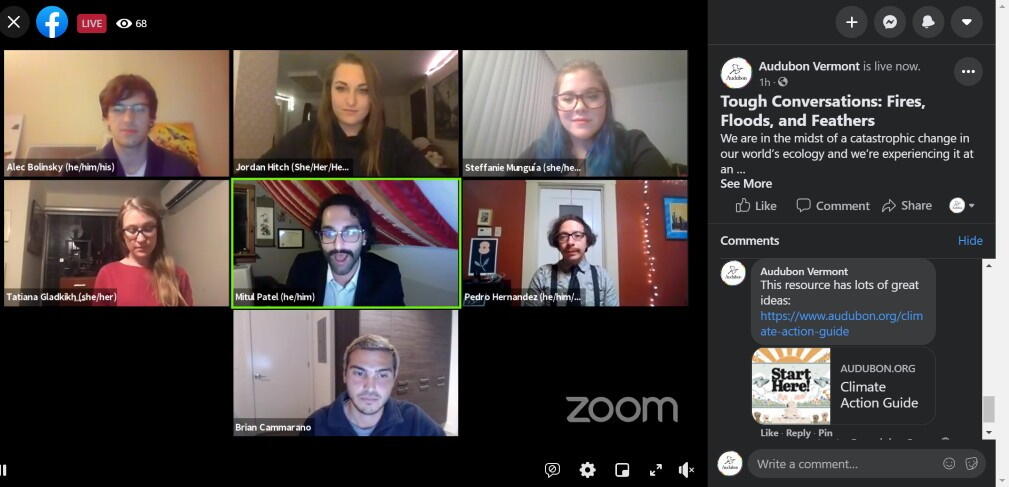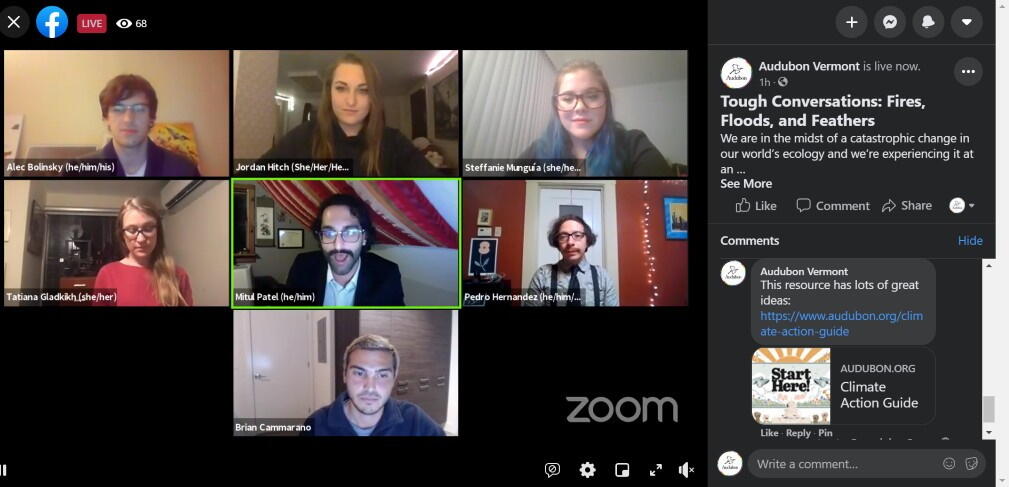Written by Alec Bolinsky, Morgan Klimmek, and Jordan Hitch, Audubon Vermont Environmental Policy Research Interns
“[We need to] break away from this psychological term of functional fixedness, where once you learn what a paper clip is then you can only imagine it functioning as a paper clip. So once you learn what ‘climate’ is in your context then you can only imagine the ramifications in your context. That’s just not how it actually operates.” - Steffanie Munguia, panelist
We are in the midst of a catastrophic change in our world's ecology, and we are experiencing it at an increasing pace. Rising global surface temperatures are causing more droughts, more frequent and intense storms, floods, fires, and a decline of bird populations. As the atmosphere continues to warm, outbreaks of diseases, such as COVID, will also continue to hamper our way of life. These topics have sparked a global discussion on how we can be doing more to save our birds and our world. Recognizing the effect climate change has on natural weather events, Audubon Vermont assembled a group of youth leaders to help us examine how our world is changing and responding to natural disasters, as well as the COVID pandemic. This discussion was the most current installment in Audubon Vermont’s Tough Conversations webinar series.
The Fires, Floods, and Feathers webinar began with an invitation for the panelists to describe their perception of the public’s reaction to COVID and the climate crisis. All of the panelists affirmed that while both crises are global issues, the pandemic has received a more immediate response because the impacts are more widely understood. At the same time, as panelist Tatiana Gladkikh stated, in order to successfully respond, our reactions to both should be “rooted in scientific evidence,” as well as “the perceptions of risks and how likely it is to affect people.”
Panelists Pedro Hernández and Steffanie Munguía both expressed concerns about how these global crises affect historically marginalized communities in disproportionate ways by exacerbating the inadequacies of our government and agencies that are tasked with solving these issues. Steffanie explained that we need to shift from thinking the United States is the only source of answers. Other countries are fighting similar battles, especially when it comes to climate change, and have found new and creative ways to respond. Steffanie identified “functional fixedness” in the United States as a barrier to the creativity needed to build the needed solutions. Marginalized communities and third world countries are experiencing climate change differently than other groups and regions and so also are compelled to find solutions quickly. The United States can learn from other countries to help its own communities, while also being a better global neighbor. As Pedro says, “this is a group project” and we need to approach it together and from all sides. We need to see how climate change is affecting everyone, not just how it is affecting us personally.
When asked about their opinions on whether generational differences exist regarding reactions to climate change, all panelists acknowledged that older generations—particularly in communities of indigenous people, black people, and women—have been fighting for environmental justice for decades. At the same time, we are seeing an increased prevalence of youth engaging in the political process and advocating for the government to respond to climate change. All panelists mentioned the energy and enthusiasm of emerging youth leaders and organizations, including the Sunrise Movement.
For people of all generations, panelists seemed to agree on the idea that, unlike with climate change, people notice the impacts of COVID more and are more cautious when they or someone they love is “at-risk.” On the other hand, as panelist Brian Cammarano discussed, when it comes to COVID, some people may be “getting sick and tired of it. [They] know the risks and are just willing to take it.” But, as panelist Mitul Patel noted, that may be more a result of different political ideology or access to information. No matter their age, the response of some to COVID and to climate change led Brian and the other panelists to worry about a culture in which people are “just thinking for themselves.”
The panelists also discussed the impact of fossil fuels consumption on the environment, the benefits and costs of increasing reliance on renewable energy, and the growing public appreciation for issues of environmental justice. Though we may want to make a change in our world when it comes to climate, there are so many other factors to consider than just the desire for change. Panelists argued for the need to look at the resources we have and how altering our use of these resources will have an effect. Mitul elaborated on this point by explaining how instead of creating something completely new, we should utilize existing structures. He stated, “We maybe put too much focus on new projects instead of taking the issues for these projects and seeing if they can be resolved in existing structures.” By being creative, examining what other countries are doing, and utilizing the existing structures we already have in more efficient and effective ways, Mitul suggests we can really begin to make a positive change when it comes to climate.
Overall, it was a lively and informative discussion. What the panelists and hosts hope to express through this webinar and others in the Tough Conversations series is that we need to make sure we are keeping these conversations going. We need to spread the word about climate change, protect each other when it comes to COVID, and every day just try to be the best that we can be. We can’t wait to see what sort of exciting conversations the next installment of this webinar series will bring!
“Feeling like you can’t make a difference? That couldn’t be further from the truth. Here’s where to begin and how to amplify your efforts to make lasting change in the world.” – Audubon’s Climate Action Guide: http://www.audubon.org/climate-action-guide
If you have questions or ideas for us about making change together, we’d be pleased to hear from you. Reach out to Audubon: vermont@audubon.org
Watch the webinar, hosted by Alec Bolinsky and Jordan Hitch, Audubon Vermont Environmental Policy Research Interns.
Tough Conversations: Fires, Floods, and Feathers. The third installment of a series of youth-led conversations about significant issues in the environmental movement.
Meet your co-hosts and panelists:
Alec Bolinsky (he/him/his): Co-host
Alec is a 3rd-year environmental law student at Vermont Law School and graduated from Wilkes University with a B.A. in Political Science. Alec joined Audubon Vermont because of its commitment to environmental justice and wildlife conservation. He is inspired to protect and assist those who may be at risk for displacement or becoming a climate refugee due to environmental impacts of climate change. Alec plans to apply his political science background to the environmental policy-based field to build a healthy inclusive future for the citizens of the world.
Jordan Hitch (she/her/hers): Co-host
Jordan is a 3rd-year Environmental Law and Policy student at Vermont Law School obtaining her Master’s and Juris Doctor degrees. She graduated from the University of Delaware in 2017 with a B.S. in Wildlife Ecology and Conservation. Jordan is currently a policy intern for Audubon VT and hopes to pursue a career involving endangered species protections and wildlife conservation and management.
Tatiana Gladkikh (she/her/hers): Panelist
Tatiana is a PhD candidate in Natural Resources at the Rubenstein School, University of Vermont. She studies human-nature interactions with the focus on environmental values and stewardship. She believes in applied research and collaborates with numerous organizations to ensure her work has land management and policy applications.
Steffanie Munguía (she/her/hers): Panelist
Steffanie is the Pan-Flyway Regional Director on the Board of the National Audubon Society, and a lifelong conservationist. As a doctoral student, she studies how policies and communities interact to manage coastal wetland resources in the Caribbean, critical stopover sites for migratory birds and a key component in building climate resilience. She attributes her environmental ethos to her Latina roots and family that encouraged her to explore nature from an early age and invite others to join her on this journey.
Brian Cammarano (he/him/his): Panelist
Brian has a degree in Ecology, Evolutionary & Conservation Biology from the University of Central Florida. This summer, he was the Lee County Anchor Steward for Audubon Florida where he monitored beach-nesting birds and conducted non-breeding surveys for migratory shorebirds moving through Southwest Florida. Brian also helps band migratory passerines at the Cape Florida Banding Station in Key Biscayne.
Mitul Patel (he/him/his): Panelist
Mitul is the Senior Managing Editor for the Vermont Journal of Environmental Law. He is currently a third-year student, with a joint Master’s in Energy Regulation and Law. Before this, he attended University of Maryland, College Park where he obtained his degree in Environmental Science and Technology. There, as a researcher, his work focused on ecological design and conservation policy. Now at VLS, he participates in multiple affinity groups, has worked as a student clinician at the Energy Clinic, has researched various energy and climate topics, and is currently working as a student delegate to the 26th Conference of Parties for the UNFCCC, specifically looking at the ocean-climate nexus.
Pedro Hernández (he/him/his): Panelist
Pedro Hernandez is the Outreach and Engagement Manager for Climate Policies with Audubon California. Based in Fresno, he works to advance climate resilience policy from the local to federal level for historically marginalized communities and wildlife. Prior to his career at Audubon California, Pedro worked for several leading environmental justice organizations in California’s San Joaquin Valley and has served as the Chair of the History Department at his alma mater, Laton High School.





